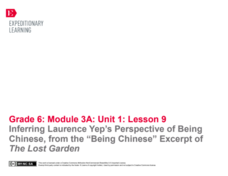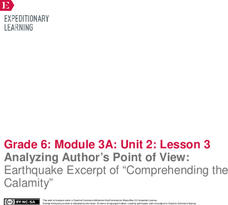EngageNY
Mid-Unit Assessment, Part 1 and Excerpt 4 Third Read
I hear you! Scholars work on the mid-unit assessment by listening to a story told orally rather than reading it themselves. After watching a video clip of Thelma Thomas performing Harriet Tubman, they answer questions about what they...
EngageNY
Inferring Laurence Yep’s Perspective on the Police, from the Crime in the Neighborhood Excerpt of The Lost Garden
Gist get to the point! Pupils read another excerpt from The Lost Garden, author Laurence Yep's autobiography. Working with partners, scholars annotate the text to look for the gist and record unfamiliar vocabulary in their word catchers.
EngageNY
Inferring Laurence Yep’s Perspective of Being Chinese, from the “Being Chinese” Excerpt of The Lost Garden
It's all about perspective! Using the resource, scholars read a third excerpt from Laurence Yep's autobiography, The Lost Garden. As they read, individuals complete graphic organizers using clues from the text to infer the author's...
EngageNY
Analyzing Author’s Point of View: Earthquake Excerpt of “Comprehending the Calamity”
How do authors convey their points of view? Using the resource, scholars read an excerpt from a primary source document about the 1906 San Francisco earthquake. Then, they complete graphic organizers to analyze the author's point of view.
Curated OER
Excerpt from Eyewitness Accounts of Slavery in the Danish West Indies"
Use the power of primary sources to help young historians understand the conditions Africans endured while being shipped during the slave trade. After reading an excerpt from Eyewitness Accounts of Slavery in the Danish West Indies,...
Curated OER
Excerpt from Elizabeth Gaskell's Mary Barton (1848)
Answering document-based questions is a great way to build reading comprehension and critical thinking skills. Learners read an excerpt from Elizabeth Gaskell's Mary Barton, then answer two related questions.
Novelinks
Words by Heart: Guided Imagery
Sad, depressed, miserable, inconsolable, forlorn: so many synonyms have a lot of variety with their connotations. Through the guided imagery activity, writers explore the use of connotation and its influence on imagery and description by...
National Endowment for the Humanities
Frederick Douglass’s Narrative: Myth of the Happy Slave
The firsthand accounts of what it was like to be an enslaved person in the mid-1800s riveted a nation and the issue ultimately led to civil war. Using excerpts from Frederick Douglass's autobiography, budding historians examine what it...
Curated OER
Excerpt from Edward Bain's The History of Cotton Manufacture in Great Britain (1835)
Great Britain was where the industrial revolution began. The class reads an excerpt from a document written in 1835 describing cotton manufacture in Great Britain. They then answer two critical analysis questions.
Facing History and Ourselves
Hands Up, Don't Shoot!
Why is it so difficult to develop a clear understanding of the events surrounding the shooting of Michael Brown by a Ferguson, Missouri, police officer? To answer this question class members listen to a NPR discussion of the findings of...
Curated OER
Researching African Americans Who Made a Difference
Celebrate Black History Month with this lesson, in which middle schoolers create an essay about a famous African-American. Writers conduct research online, take notes to write an essay in proper format, and use ideas, text, and graphics...
Curated OER
Finding the Main Idea
The carnival is in town! After reading a short excerpt about a day at the carnival, learners use details to determine the story's main idea. They must differentiate the details from the big picture, as there are multiple options they can...
Curated OER
Book Excerpt from "The 23rd Cycle"
In this solar storms worksheet, learners read an excerpt from the book "The 23rd Cycle: Learning to Live with a Stormy Star". Students answer 7 questions about the effects of solar storms on radiation exposure, health risk of airline...
Humanities Texas
Primary Source Worksheet: Theodore Roosevelt, Excerpt from “The Square Deal” Speech
Talk about a timely resource! As part of a series of primary source exercises, individuals read and respond to questions about Theodore Roosevelt's "The Square Deal" speech. Roosevelt reminds us of what our social system should be.
Humanities Texas
Primary Source Worksheet: Theodore Roosevelt, Excerpt from “The Man in the Arena” Speech
Theodore Roosevelt's "The Man in the Arena" speech not only provides individuals with a chance to develop their reading skills but also provides much food for thought about current political situations. Cynics, fops, and voluptuaries...
University of North Carolina
The Narrative of the Life of Frederick Douglass, an American Slave
After reading excerpts from Frederick Douglass' autobiography, pupils will draw on what they've learned about the cruelty of slavery to write and present an anti-slavery speech or editorial.
Teaching American History
Interpretation of the Declaration of Independence
Ready to interpret the Declaration of Independence and understand its meaning? The resource divides scholars into pairs, where they work as a team to match translations with excerpts from the declaration. The class then engages in...
Edgate
The Intrusion of Strangers
How did Native Americans react to the arrival of the Lewis and Clark expedition? Here, learners review excerpts of journal entries that chronicle the arrival of the Corps of Discovery to the Shoshone and Blackfeet tribes. Your young...
Poetry4kids
Onomatopoeia Poetry Lesson Plan
Two exercises boost scholars' knowledge of a onomatopoeia with excerpts from famous poems. In exercise one, participants circle onomatopoeia words. Exercise two challenges writers to choose three words to use in an original poem.
Curated OER
Walk Two Moons: Question Answer Relationship Strategy
Middle schoolers develop a strategy as they read excerpts from Walk Two Moons. Using question and answer relationship strategies class members bolster their reading comprehension as they appropriately identify and create questions.
Poetry4kids
Simile and Metaphor Lesson Plan
Similes and metaphors are the focus of a poetry lesson complete with two exercises. Scholars read poetry excerpts, underline comparative phrases, then identify whether it contains a simile or metaphor. They then write five similes and...
Poetry4kids
Personification Poetry Lesson Plan
Scholars take part in two exercises to boost their knowledge of personification. After reading a detailed description and excerpts from famous poems, writers list action verbs and objects then combine words to create a humorous...
Student Handouts
The Cold War: The Truman Doctrine of 1947
What was the Truman administration's position on foreign policy during the Cold War? Class members respond to an excerpt from President Harry S. Truman's "Truman Doctrine" with three questions in the space provided.
Gilder Lehrman Institute of American History
Slave Narratives: Frederick Douglass, Harriet Jacobs, and the Columbian Orator
Young historians practice in-depth, quality analysis of primary source texts in this three-lesson unit, which examines excerpts from the slave narratives of Frederick Douglass, Harriet Jacobs, and Caleb Bingham.
Other popular searches
- Reading Excerpts
- Biography Reading Excerpts
- Excerpts From Black Boy
- Excerpt From the Novel
- Excerpt the Great Gatsby
- Excerpts of Foreshadowing
- Book Excerpts
- Hamlet Excerpt
- Text Excerpt
- Excerpts of Memoirs
- Story Excerpts
- Listening to Music Excerpts

























